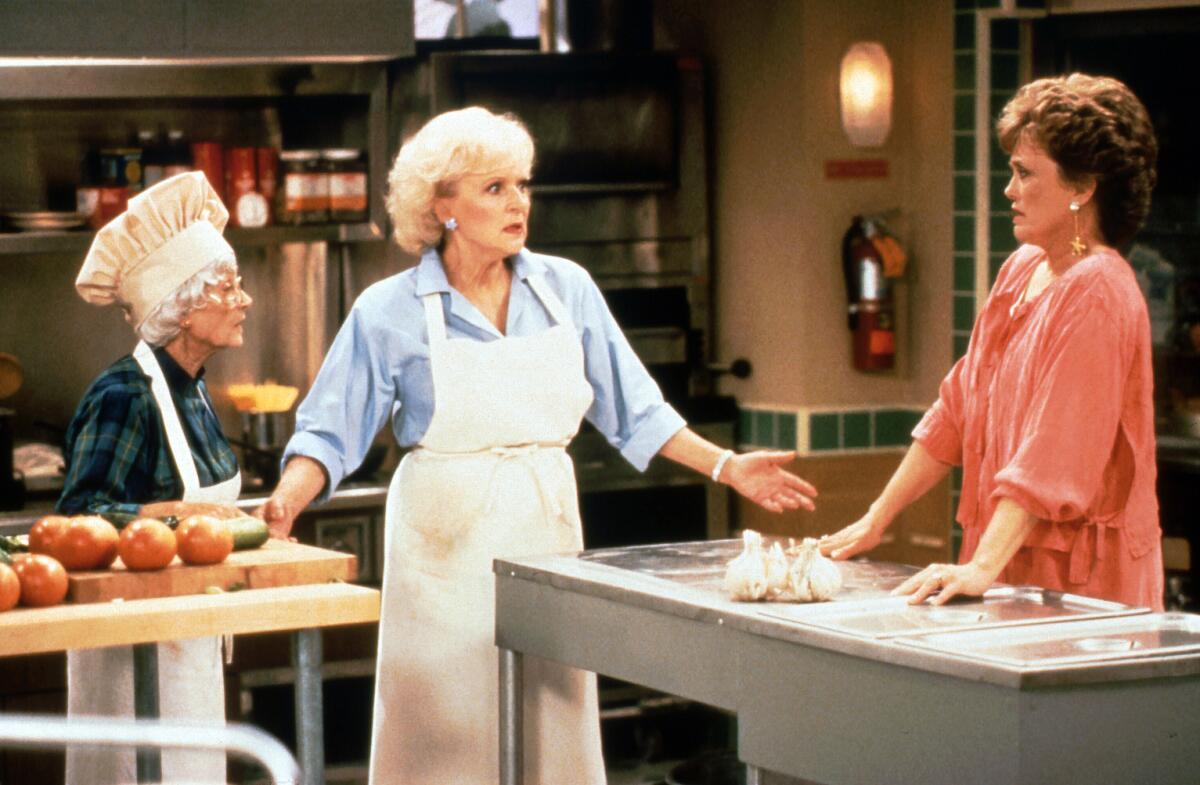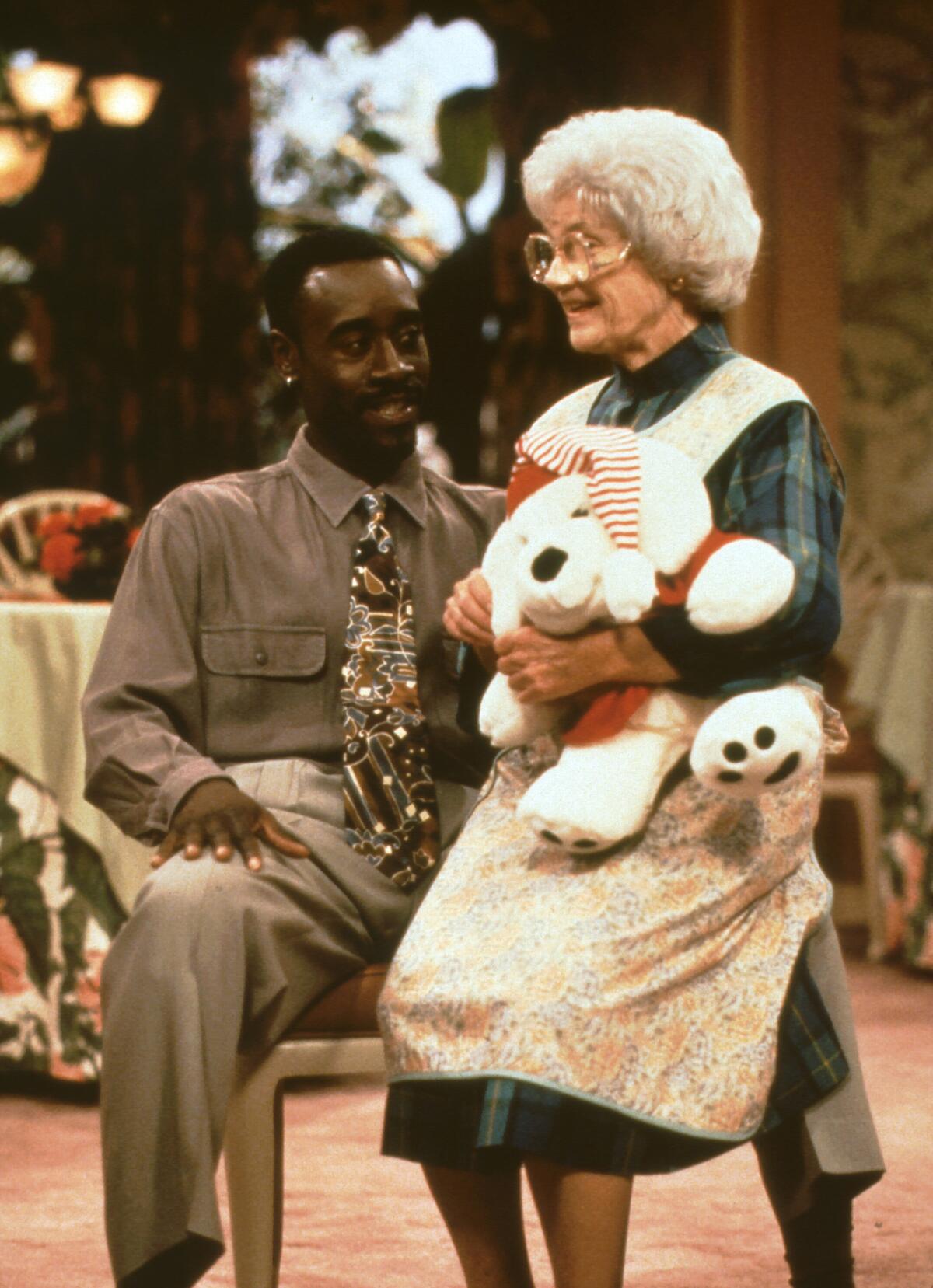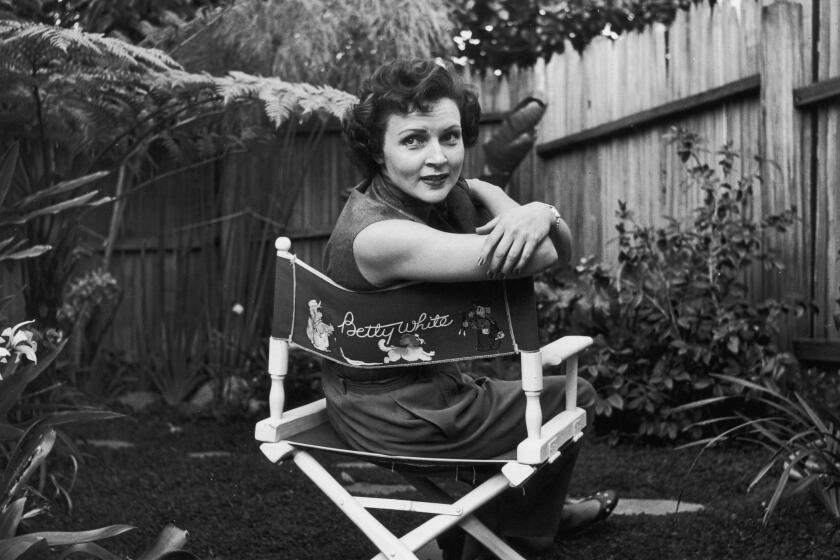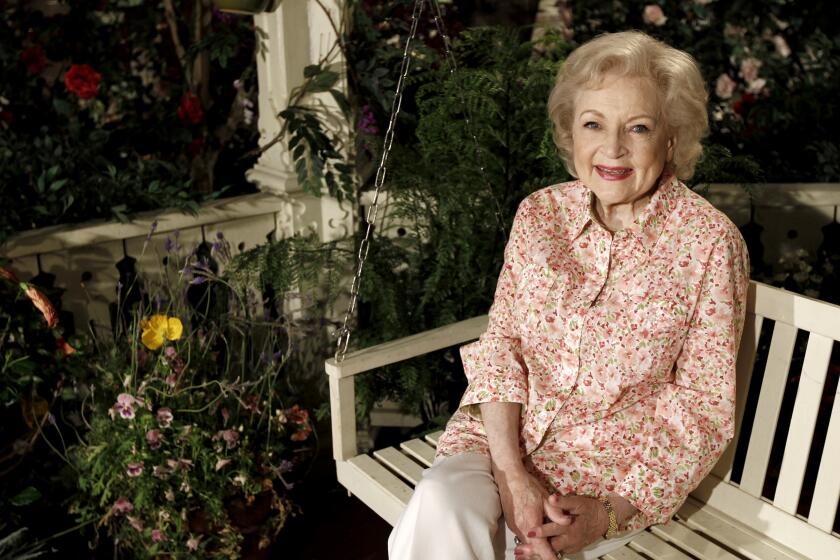If you need a new, old-fashioned sitcom to watch, this ‘Golden Girls’ spinoff is for you

- Share via
New to Hulu as of Monday is “The Golden Palace” — 24 episodes dropped at once — which shares a theme song and three actresses with “The Golden Girls,” a show about three widows and a divorcee sharing a house in Miami. Set in an age of padded shoulders and roomy pants, it is an old-fashioned, multicamera affair, to the point even of the cultural references, which may require recourse to the encyclopedia: Gordon McRae, Leona Helmsley, Señor Wences, Jimmy Swaggart, Paul Prudhomme, Chia Pet, the musical “Li’l Amber,” “I Dream of Jeannie” and “That Girl.”
In “The Golden Palace,” which turns a domestic comedy into a workplace comedy (albeit a workplace in which the characters also live), Blanche (Rue McClanahan), Rose (Betty White) and Sophia (Estelle Getty) buy a hotel they have been assured is a good investment but which turns out to be a bad one, even though it is a well-equipped beachfront property. The staff they find has been reduced to two: manager Roland (Don Cheadle, a young man who should go far in this business) and chef Chuy (Cheech Marin, moving beyond comedy), adding Black and brown actors where formerly there were none. There is also a child, Oliver (Billy L. Sullivan), because that must have seemed a good idea, until his deaccession halfway through the season.
Although the hotel does better or worse depending on the needs of any given episode, there are often few to no vacancies, and the dining room is usually full. Still, there are no new hires, the entire hotel and restaurant being run by the aforementioned cast. (Getty, around 70 — and playing around 90, I reckon — busses tables.)
Blanche, like DuBois, is what one might call extremely sex-positive, a woman who wore out three mattresses guaranteed to last a lifetime; Rose, a child in Betty White’s body, is a sweet Midwestern farm girl of fanciful Scandinavian descent; and Sophia intimates intimate knowledge of organized crime. Sometimes they get to play against type, or express deep-ish thoughts or real emotions, or just explode. “You tell that ungrateful vermin at table four if he doesn’t shut up about his damn muffins I’ll pour hot butter in his nooks and crannies,” spits Rose, uncharacteristically, for the laugh.
Television was White’s medium, and her understanding of what it means to live on camera — her ease, her intimacy — was matched by few before or since.
Should you watch this show? Even with 24 episodes, you can get through it all in a few dedicated nights, so why not? Does it matter that you can supply the punchlines to a good number of jokes before the actors get there? As when Blanche’s son Matthew (guest Bill Engvall) confesses, “We like the same things,” and she answers, “Oh my God, you’re gay.” Perhaps that will make you feel brilliant. Perhaps it will just feel comforting, as when you open the door to your own house after a rough day away.
The cast is great — legendary, one might say — even if they are playing in a sequel to a show people remember better and love more. And If nothing else there are 24 episodes worth of Betty White that were unavailable a week ago. Guest stars include George Burns, Eddie Albert (playing a character called Mr. Douglas), Bobcat Goldthwaite, Barry Bostwick, Ned Beatty, Ricardo Montalbán, Harvey Korman and Tim Conway amid other notable emissaries from the late 20th century. Bea Arthur, the absent Golden Girl, pays a two-episode visit.

There are a lot of sex jokes, and jokes about being old, and the dynamite combination of jokes about sex and being old. (You might plausibly regard them — some of them — as empowering.) Blanche, as mentioned, is much concerned with sex, and many of her lines have to do with the sex she wants to have, or has had and sometimes is having. (It is, of course, not the sort of show in which people are seen in bed together, unless, say, the women have to bunk together to free up a room.) Sophia calls her a “slut” and like endearments, though she herself has a habit of commenting on men’s backsides. Even Rose has a story about dressing up as storybook characters with her late husband or making love in their barn. (Blanche: “How could you do it with all those cows watching you?” Rose: “How could you not?”) Occasionally Marin is handed a pot joke, because he’s Cheech Marin. (“Do I look like the kind of guy that would smoke marijuana?”) But he’s given sex jokes too.
Some jokes do sound as if they were written, well, 30 years ago. An episode in which the hotel is repeatedly mistaken for a Chinese restaurant works to a nub a gag in which “Who me?” is meant to sound like a Chinese name and enlists Margaret Cho to say, “Dog? No cook dog!” A line about looking like “the last of the Mohicans” is meant to indicate a flushed complexion. There are gags about women who look like men, and women who look like men dressed as women. There is a sexual harassment joke — “You lick one gardener on the back of the neck, all of a sudden it’s a federal offense,” Blanche says — I will leave you to process or let slide. (It is, in any case, consistent with the character.)
TV pioneer Betty White died from a cerebrovascular accident — a stroke — that the ‘Golden Girls’ star suffered days before she died at age 99.
On the other hand, there is one clear engagement with the past, present and future — an exchange you might have seen rocketing around the internet — when, in the episode “Camp Town Races Aren’t Nearly as Much Fun as They Used to Be,” the intensely Dixie-fied Blanche hangs a Confederate flag in front of the reception desk to welcome guests from the Daughters of the Traditional South and Roland threatens to quit.
“This flag is not about college football games or quilting bees or fried chicken on Sunday,” he will finally say, by way of educating her. “It’s about colleges that won’t let me in; it’s about companies that won’t hire me; it is about crosses being burnt on people’s lawns today, not in the evil past, Blanche, today.” Adding for regional balance: “And not just in the south, Blanche, the north is just as bad.”
“Damn Yankees,” says Blanche, who goes on to wonder, “What am I supposed to think about all those people I love? What am I supposed to think about me? All my wonderful memories. They‘re all tarnished now by … the truth.
“White people are going to have to start making positive assumptions when they say people of color.” Adding for racial balance: “And people of color could make positive assumptions when they see white people.”
Handshake, soul shake. Applause. Hug. In 30 years it should all be fine.
More to Read
The complete guide to home viewing
Get Screen Gab for everything about the TV shows and streaming movies everyone’s talking about.
You may occasionally receive promotional content from the Los Angeles Times.









